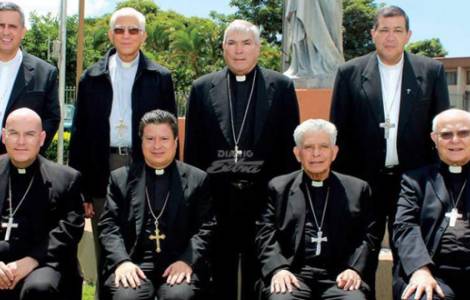
San José (Agenzia Fides) - "Costa Rica is the victim of the lack of decisions aimed at a structural reform of the State, to truly reactivate economy, to contain public spending and to promote production. In recent decades, the country has undergone various agreements, the result of negotiations with the International Monetary Fund and other types of structural adjustments. As Pastors of the Costa Rican Church, we strongly ask that the most vulnerable and productive sectors are protected; In particular, we ask that the collection of taxes to be improved, with efficient and transparent mechanisms; avoiding tax evasion, thus avoiding corruption and irresponsibility". This is how the Episcopal Conference of Costa Rica expresses itself in its recent message of 21 September which comments "the presentation of what would be a new Tax Adjustment by the authorities of the Executive Power of our country".
The Bishops certainly do not ignore the serious consequences of the Covid-19 pandemic, but call upon the rulers in power in the last thirty years to assume their responsibilities for the situation in the country, already precarious before the pandemic, and note: "Inequality, poverty and unemployment are only consequences of an economic model that does not place the human being at the center of its development".
Therefore the message underlines: "a reduction in public spending is essential"; taxes "should be progressive and not on proposals that include regressive taxes, which affect the most vulnerable"; do not make cuts in social programs for the poorest and most needy. In this regard, the Compendium of the Social Doctrine of the Church (n. 355) quotes: "A fair, efficient and effective public finance produces virtuous effects on the economy", requires "rigor and integrity in the administration and allocation of public resources" .
The Bishops' Conference also points out that "over the years, the middle class of our Country has been left with very few opportunities for greater progress, better access to housing or growth opportunities, precisely because some of the taxes created have been charged to this middle class. In recent years, and according to the new adjustment plans, this sector will again suffer a severe blow". The Bishops therefore exhort an authentic dialogue, "which takes into account the various contributions of social groups, to provoke a healthy confrontation with the sole purpose of seeking the common good, social justice and the integral development of people".
The Bishops conclude by recalling the words of Pope Francis in his Encyclical Laudato Sì (n. 189): "Politics must not be subject to the economy…there is urgent need for politics and economics to enter into a frank dialogue in the service of life, especially human life" and launch an appeal "to take a break, not to speed up decisions that mortgage the country's future for a few decades". (SL) (Agenzia Fides, 23/9/2020)